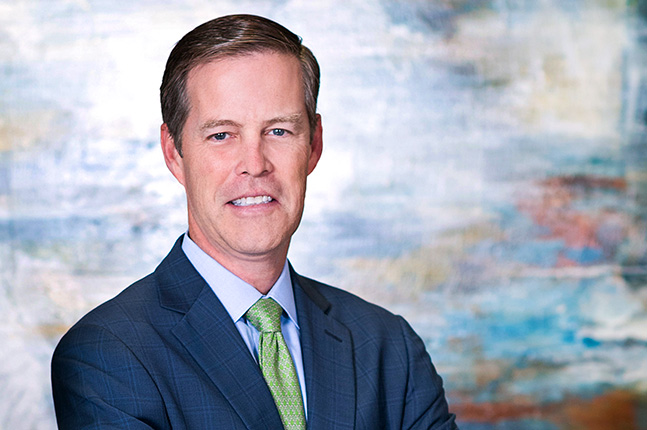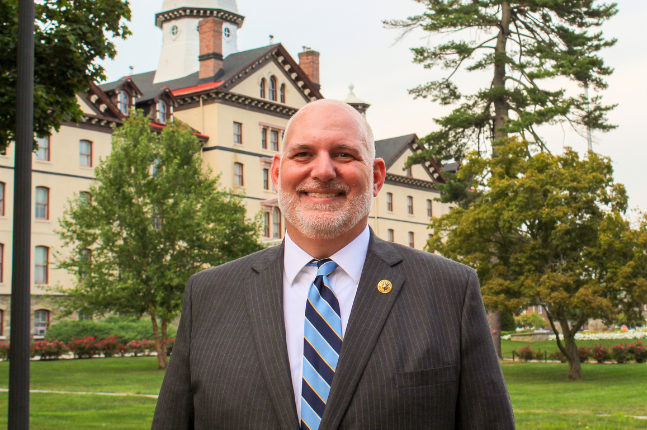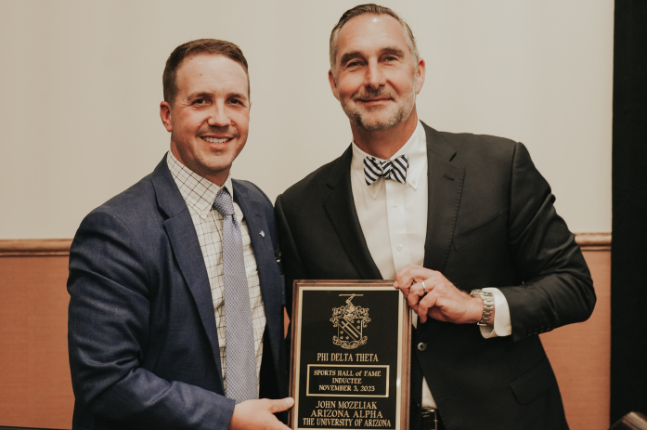Experiencing a diverse chapter membership prepared Gary for a life of leadership and the desire to provide similar opportunities for students in need.
For those on the outside, a farm life implies a hard-working life from sunup to sundown. But, when you’re born into it, it’s a way of life.
Brother Gary Norcross lived on his family’s Arkansas farm and learned about hard work early. Starting at nine years old, he worked the fields from 6 a.m. until noon, chopping cotton. Then, at twelve, he graduated to driving a tractor.
Because his family valued education, Norcross joined his brother at boarding school in the eighth grade. His parents did everything they could to make this education possible. Norcross understood their sacrifice and took campus jobs to help. He opened and closed the school’s library most weekends, and on a few weeknights, he worked in the campus movie theater.
At boarding school, he learned the impact of a peer group and the value of having friends when family visits happened infrequently, during holidays and the summer breaks.
Attending college was assumed for the Norcross boys, and the University of Arkansas was the school. The Norcross family plan was for Gary to go to college, learn what he could about business practices, and broaden and build his statewide contacts in the Arkansas farming industry. His older brother had hopes of pursuing other things.
At the University of Arkansas, Gary’s brother and a couple of cousins had become members of the Arkansas Alpha Chapter of Phi Delta Theta. Gary laughs and says it was easy to see what group he would affiliate with. And he knew from his boarding school experience that having a tight-knit group of friends in the vastness of a huge state school would make it feel a little more like family.
At the time, Arkansas had summer recruitment. So, when Arkansas Alpha offered Gary a bid to join Phi Delt, he accepted, and he lived in the house at the start of his first year at Arkansas. At the time, over sixty brothers lived in the house, and rooms were reserved especially for officers and first- and second-year students. This experience was formative in his relationships with his brothers, who’ve remained lifelong friends.
Meeting guys from different backgrounds, states, and experiences appealed to Norcross, as did the opportunities for philanthropy, so he served the chapter as its philanthropy chairman. He learned the value of giving back to important causes such as muscular dystrophy and the American Heart Association. Having a role as an officer was an early influence in his leadership development.
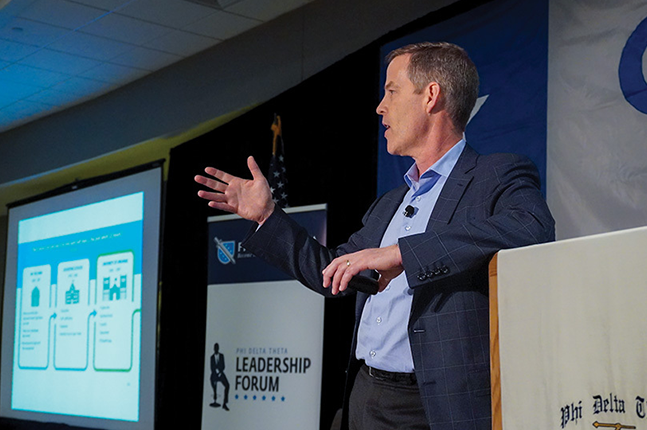
Today, Norcross and several of his fraternity brothers remain close friends. He says they’ve stood in each other’s weddings, celebrated children born and raised, met up on campus, and, when possible, attended a Razorback football game or alumni weekend. Now their group’s children are getting married and having children. This group has been a steady source of encouragement (and some great laughs) throughout his life.
In addition to meeting his friends at Arkansas, Gary met his Chi Omega wife, Amy. An elementary school friend introduced them, and they were married soon after they graduated college. In May 1987, Gary Norcross graduated from the Walton College of Business.
Remember, the family plan was for Gary, the youngest of the two Norcross boys, to return home to take over the family farm. However, when it came time for graduation, Gary thought it would be beneficial to have an experience working for someone else before he returned home.
In his last semester, he acquired a position with Systematics, Inc. in their training program. Unfortunately for Gary, later that spring, the company had to withdraw its offer because the funding for the training program had fallen through. So, he scrambled and found a position as a loan originator with a financial institution. It was 100 percent sales and commission. Though it wasn’t precisely what Norcross had hoped to be doing, he took on the challenge entirely and was a very successful loan originator by the end of his first year.
When the Systematics training program’s funding was restored, the company reached out with an offer to begin working as a programmer. Though Norcross had no classes in computer programming or experience, he enthusiastically accepted and started his on-the-job training to learn. He worked in many positions and departments in those early years. When some of the young employees chose to move up within a single department, Norcross felt a broad exposure across various departments within the company would serve him better long-term. He helped develop software, helped implement software, then began selling the software. He moved laterally about every twelve months.
While Gary was growing and learning in each new department, his older brother graduated with his master’s degree and returned to join the family farm. What was originally going to be a short foray into the non-farm world turned from one year then to two. Finally, as Norcross continued to excel in the late 1980s and early 90s, it became clear that he would not return and join his brother but instead would pursue a career outside of agriculture. His older brother continues to run the farm to this day.
At Systematics, he was a well-respected employee, building networks and allies along the way. By 1996, there were thirteen different companies within the organization. At one point, there was one that was underperforming and likely to be closed. In a meeting to discuss what to do with this failing enterprise, the question was raised who would be the person to do it? Gary raised his hand. His mission directive was clear: to close the business.
But Gary, never shying away from challenging work, wondered, if he could identify this company’s weaknesses and address areas of improvement, could he turn this business around? So, in his first two weeks on-site, he cut the staff from seventy-seven to fifty-two, gathered the remaining team together, and started building a strategy. He was transparent about the dire situation of the business, something that the employees had not been aware of. Because Gary regularly sought their input, the team rallied, and slowly but surely, they were able to turn the losses into gains.
“If you can galvanize a team, you can do anything,” shared Gary about that early effort.
In 2007, Norcross became COO partly because of his overwhelming turnaround of that once failing business. Under his leadership, that company went from a revenue stream of $3.2 million and losing $2.5 million a year to generating over $3 billion in revenue and generating most of the profits for the company. While the initial layoff was one of the most challenging things he had done, capping off the success was being able to hire back every one of the employees they had to let go.
“If your actions can inspire others to dream, learn, and risk more, you can view yourself as a successful leader.”

Today, Gary’s inspirational actions come through the Norcross Foundation he set up with his wife, Amy. The Foundation helps fund academic scholarships to first-generation students and students in financial need at schools the Norcrosses believe in and have played a role in their family’s life. For Phi Delta Theta, the Norcross family supports diversity and inclusion education as part of the membership development initiatives of Campaign 2030, the ten-year capital campaign.
Coupled with the First-Generation Student Scholarships initiative, the Norcross Leadership Gift to the campaign will help enrich the life experience of every Phi Delt. Education via PDT U and the revised chaplain position that is being introduced this summer will teach the value of diversity and ensure that Phi Delta Theta is a welcoming place to all types of students. To add a level of support and education for this position, a chaplain from each chapter will attend the 2022 Kleberg Emerging Leaders Institute so they can return to their campuses and implement this essential new education.

Advice to Graduates
In an excellent podcast by the Walton School of Business, Be EPIC, Norcross offered his advice to students graduating from college today. Here’s what he said.
When it comes to starting your career, “you’re really not going to make a bad decision. Find an opportunity that interests you and always stretch yourself to be uncomfortable. You always want to be ahead of what you know. Take the risk. Early in your career, if you stretch and grow and take risks, what you learn will become exponential.
And you’re going to have to work really hard. It’s highly competitive. Don’t fear work; enjoy it. And get in there and always try to make a difference and try to ask the questions, find the mentors, get people that can empower you to help you take your career where you want it to go. And don’t be scared to pivot.
At some point, you might have a lot of passion around a topic, and you’re two years in and find out, ‘This isn’t exactly what I thought it was going to be. Even though my degree is in this particular area, I want to move; I want to try something different.’ And if you do that, I think you’ll have a phenomenal career.”
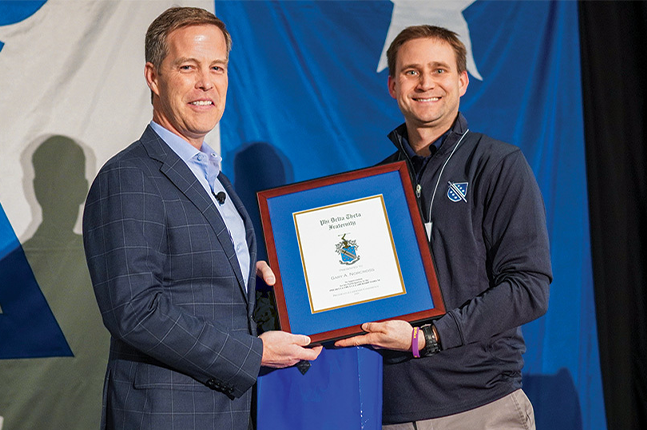
Tips from a successful leader
When asked what has helped make him a success, he mentions the following:
- Know your strengths and surround yourself with leaders with different strengths.
- Build a diverse team with differing backgrounds, strengths, opinions, and strategies.
- Be inclusive and always listen.
- Admit when you make mistakes and take responsibility for them. Then, learn from the experience and let that knowledge influence future decisions.
- Celebrate loyalty.
- Find experts in fields in which you want to grow.
- Pick your mate wisely. Gary and his wife, Amy, are equal partners in their journey, and she too was on board to pick up roots and move their young family from Arkansas to Florida in 1996 and has been integral in their philanthropic work.

